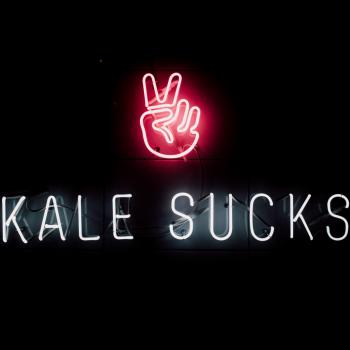Spoiler alert (or should I say plot revealer?). If you don’t 1) already know what “Calvary” means and/or 2) don’t want to know some revealing details about the plot, read no further.
As I said, this review is a bit of a spoiler – but no more than the title itself. If you know anything about what “Calvary” means, you’ll know how the film must end. Calvary is – get ready for it – the Anglicized version of the Latin Calvariae Locus from the Greek Kraníou Tópos, which is a transliteration of the Aramaic Golgotha– all meaning the Place of the Skull. This is the site just outside of Jerusalem where Jesus of Nazareth was crucified. With a title like that, you know things cannot go well for the central character, Father James.
 Calvary is a brilliant film written and directed by Irish filmmaker John Michael McDonagh. It is thoroughly Irish. By this I mean that it’s a dark comedy. The film chronicles the final seven days of Father James, played by Brendan Gleeson. Fr. James is a Roman Catholic priest in small town Ireland. McDonagh begins the narrative with the most arresting scene of the entire film. Father James hears the confession of a parishioner. The man informs Father James that he was raped repeatedly by a priest over a period of five years as a young boy. Because of this, he states: “I’m going to kill you because you’ve done nothing wrong.” The evil priest who abused him is dead. So the man in the confessional plans on executing his own version of lex talionis on a good priest: the spoiling of an innocent priest’s life for the spoiling of an innocent boy’s.
Calvary is a brilliant film written and directed by Irish filmmaker John Michael McDonagh. It is thoroughly Irish. By this I mean that it’s a dark comedy. The film chronicles the final seven days of Father James, played by Brendan Gleeson. Fr. James is a Roman Catholic priest in small town Ireland. McDonagh begins the narrative with the most arresting scene of the entire film. Father James hears the confession of a parishioner. The man informs Father James that he was raped repeatedly by a priest over a period of five years as a young boy. Because of this, he states: “I’m going to kill you because you’ve done nothing wrong.” The evil priest who abused him is dead. So the man in the confessional plans on executing his own version of lex talionis on a good priest: the spoiling of an innocent priest’s life for the spoiling of an innocent boy’s.
There’s no point in killing a bad priest. But killing a good one – that’d be a shock. [They] wouldn’t know what to do with that. Killing a priest on a Sunday, that’ll be a good one.
The rest of the film follows Father James as goes about his normal priestly duties as the final seven days of sand in the hourglass mercilessly falls. We accompany Fr. James as shepherds his thoroughly wayward flock as he would on any other week. The film focuses in on twelve or so “disciples” who provide the viewer with an education on the range of human vice. In his final seven days, Father James shows us what it means to be (to borrow from Richard Baxter) “a dying man preaching to dying men.”
Calvary is a film about a priest. What I’d like to do now is less review and more theological reflection on how McDonagh portrays the priestly office.
THE OFFICE OF PRIEST
Not all priests are bad priests – this is clear enough. But we rarely hear about the good ones. Real life, actual bad priests make it all too easy for the media and culture to poo poo the priestly office. It is easy to create and lambaste bad priests; it is difficult to create and laud a good one. McDonagh’s portrayal of a Father James, is therefore, exceptionally praiseworthy.
Four priests play a role in Calvary. Three are shallow stereotypes; one is surprising and fascinating. We learn progressively more about each of the four priests. First, there is the evil priest who raped the young boy – he is nameless, faceless. Second, there’s the aloof bishop (?) who advises Fr. James from his lavish garden and stately residence. He is one part bookish paired with four parts affectation. He naively prides himself in knowing the heart of man. The reality, however, is that he’s out of touch with the hoi polloi because he doesn’t appear to spend much time with them. Third, there is, Father Leary, who perfectly fits his name. He is an aloof priest who pastors the parish alongside Fr. James. He lacks integrity, is self-righteous, and disgusted by his flock. He seems to have a subtle loathing for those whom he is to love and lead. He is simply not suited to be a priest. McDonagh isn’t particularly creative with his portrayal of the first three “types” of priests. Though they become progressively more complex, they are all, to one degree or another, stereotypical.
And then…and then there is Father James: the priest for whom we’ve all been waiting.
Father James is a man soiled by the earth. He’s a recovering alcoholic and widower, he is somewhat estranged from his suicidal daughter (played by Kelly Reilly). He’s made of the stuff of the earth and this is precisely what makes him fit for redeeming it. As Xan Brooks of The Guardian comments: “Here, at least, is a Christ we can relate to.” [1] He is a Christ figure with whom we can relate precisely because he can relate to us.
For the typical imagination, Fr. James doesn’t fit into the paradigm for the priesthood. He has a daughter (from a woman he was married to). He’s a recovering alcoholic. He’s not greedy. He’s not aloof. He’s not easily fooled nor is he easily offended. He’s witty and intelligent. He is, indeed, the “good priest.” As such, his parish hardly knows what to do with him. About him a character states: “An interesting man… A good man. A fine man. Nobody around here has anything bad to say about him…makes you wonder what he’s hiding.”
Father James causes cognitive dissonance. He really doesn’t fit the mold. Despite all this, he is the priest we all fundamentally need, even if we could never articulate our impoverishment.
LOVE AND THE PRIESTLY OFFICE
What makes Fr. James such a remarkable character and such a remarkable priest is his capacity to love.
Father James has such a capacity to love because he is a student of human nature. He reads people and understands them. He sees behind the facade. He sees through the presentation and patiently pursues his people. He remains true even in the face of a town of masks. When you truly understand what is in the heart of man, you are confronted with two options. You must make a choice between love fueled by compassion or hatred fueled by contempt. You can vacillate between the two for a time, but with real insight into the depths of humanity, one must ultimately make a choice. Father James chooses love.
One of the primary ways Fr. James loves people is through honesty. He is a man devoid of platitudes. He speaks words of truth. He tells is like it is and he doesn’t permit his people to not return the favor. When correcting and counseling his people, he refuses to mince words and refuses to take any BS. At the same time, he asks more questions than gives answers. I think this is less him playing at Socrates and more the result of not knowing the answer to their questions. Other times, I think he realizes that the giving of an honest answer may actually not be helpful because they can’t receive it at the time or must discover it on their own. In either case, Father James loves by not shrinking back from confrontation.
Rightly does Ambrose instruct on the duties of the priest: “A wise man, intending to speak, first carefully considers what he is to say, and to whom he is to say it; also where and at what time. There is therefore such a thing as due measure in keeping silence and also in speaking; there is also such a thing as a due measure in what we do. It is a glorious thing to maintain the right standard of duty.” [2]
Father James sees and then speaks. He loves his flock too much to allow them to persist in their own way. Father James is an honest man. He loves by refusing to lie – to himself or his people – despite the implications of the truth.
A light-hearted example occurs of Father James near the start of the film. Father James confronts the communion-wine-drinking altar boy Miho, for whom he has much affection.
Fr. James: Is this some kind of ploy on your behalf? I’ve noticed the stocks of booze diminished of late…is this some kind of ploy to cover up for the wine you’ve been drinking on the QT?
Miho: I have no idea what you’re talking about. Father Leary noticed nothing amiss.
Fr. James: Father Leary does not know you as well as I do, Miho. He may well underestimate the depths of your Machiavellian chicanery.
Lastly, Father James honors the priestly office by ennobling his people. He loves his parish by affirming their inherit dignity and this despite their past or present conduct or any glimmer of hope of their amending. He does not quit on his people. He fulfills his office of priest and maintains hope, even against hope. One example of this occurs when he visits Freddie Joyce in prison. Freddie is a psychopathic serial killer and town pariah. Absolutely nobody is happy Father James visits him in prison and yet he visits all the same. Though it’s unclear if Freddie could ever understand the evil he committed and so repent, Father James offers him whatever consolation he can. At the same time, his conversation with Freddie lacks any semblance of cheap grace. He approaches Freddie without despair or presumption, as the quote from St. Augustine at the opening of the film instructs: “Do not despair; one of the thieves was saved. Do not presume; one of the thieves was damned.” Despite the violence the characters do to themselves and to one another, he maintains the belief that every life is sacred. He loves them despite their unloveliness. He fulfills his priestly duties. He is a good priest.
THE FINAL LESSON
I have heard it said that one of the primary tasks of a priest is to teach his people how to die well. Father James does precisely this though it’s uncertain if the twelve disciples will ever learn. As with all great teachers, their greatest statement is less a memorable turn of phrase (though they all have that) and more the aggregation of their life’s conduct.
The arresting conversation in the confessional in the very first scene ends with this exchange:
Killer: Do you not have anything to say to me, Father?
Fr. James: Not right now – no. But I’m sure I’ll think of something by Sunday week.
Over the next seven days, the film shows Father James thinking through his final lesson. It comes in two parts. Part one is found in his final conversation with his daughter:
Fr. James: I think there’s too much talk about sins and not enough talk about virtues.
Daughter: I think you’re right. What would be your number one [virtue]?
Fr. James: I think forgiveness has been highly underrated.
Daughter: I forgive you. Do you forgive me?
Fr. James: Always.
Forgiving and having been forgiven, Father James walks to the sea to wrap up his final lesson. He faces and therefore unmasks his killer on the beach. In so doing, he teaches his people how to die well, not only with his words but with his very life: “having loved his own who were in the world, he loved them to the end” (John 13:1b).
[1] Xan Brooks, “Calvary review – ‘a terrific black comedy that touches greatness‘” in The Guardian, 12 April 2014.
[2] Ambrose, On the Duties of the Clergy, Ch. 10
I still have more to say on the film. I invite you to check out my upcoming essay on how Calvary depicts what it means to be human. The essay will be published at Transpositions, the blog of the Institute of Theology, Imagination and the Arts at St. Andrews University (UK). I’m very happy to announce that I’ve recently become a regular contributor for the blog. Check it out: it’s full of helpful reviews and great essays.











